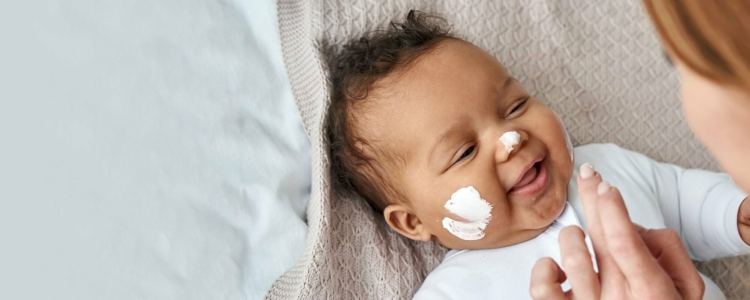Spit-up
Frequent reflux or regurgitation in infants is completely normal. At birth, the muscle that prevents milk from flowing back into the baby’s mouth is not yet entirely developed, which causes reflux.
This phenomenon generally decreases at 6 months of age and ceases definitively at around 1 year of age. In order to reduce regurgitation, make sure to burp baby thoroughly after feedings.
See a doctor if your baby:
- Seems to be experiencing pain
- Vomits violently several times a day
- Is not gaining sufficient weight
Colic
Colic, which is associated with intense crying and can last several hours, is completely normal. Contrary to what one might think, colic and diet are unrelated.
Colic can be considered a part of the development of a healthy baby. It occurs mostly late in the day or in the evening, at around 2 or 3 weeks of age and significantly decreases at around the third or fourth month.
If your baby drinks too quickly, or chokes and starts to cry, this can cause baby to swallow air. This can make baby feel bloated and uncomfortable. To provide relief, burp baby more thoroughly and make them take a few breaks during feedings.
How to relieve colic in newborns
- Start by making sure your baby is not crying because they are hungry.
- Check if baby is running a fever.
- Take baby in your arms in a quiet place. Place baby flat on its stomach on your forearm, with its back against your stomach, its head in the crook of your elbow, your hand between baby’s legs.
- Walk or rock baby in your arms. Movement seems to help relieve certain babies.
- Give baby the breast or a pacifier. Suction also seems to help relieve certain babies.
Constipation
Past the age of 6 weeks, your baby may sometimes go several days without a bowel movement without necessarily being constipated.
However, if baby seems to be in pain and her stools are small, hard and dry, she is probably constipated.
How to relieve constipation in children
- Infants who are breastfed exclusively are rarely constipated. Before concluding that the problem is indeed constipation, make sure baby is getting enough breast milk.
- If baby is formula-fed, give them 15 ml of previously boiled water in between feedings.
- For constipated babies who are 6 months or older, give them an additional portion of vegetables, or even a purée of prunes, alone or mixed with other fruits.
“Gastro” (gastro-enteritis)
In itself, gastro-enteritis in children is not worrisome, but it does include risks of dehydration, which can lead to grave consequences. A child with gastro may experience difficulty in drinking, and throw up even when given plain water.
To make sure your child is ingesting sufficient liquids to make up for fluids lost in stools, urine and vomit, you can use a children’s oral rehydration solution (e.g., Pedialyte®) available at your pharmacy, which contains mineral salts that are essential for the body to function properly and promotes proper absorption.
Home recipes: to be avoidedIt isn’t easy to obtain precise concentrations of mineral salts and glucose that are effective, adequate and safe. Use a commercially available product unless you find yourself unable to do so. |
Dehydration can sometimes prove fatal. See a doctor without delay if:
- Your child produces very little urine or their urine has an unusually dark yellow colour
- Your child’s mouth is very dry
- Your baby’s fontanelle (the soft space between the bones of an infant’s skull) seems more hollow than usual (in babies aged 6 months or less)
- Your child cries without tears
- Your child seems weak and drowsy
- Your child’s stools contain blood or are black
- Your child has diarrhea for longer than 5 days
Otitis
In children, otitis can be caused by bacteria or a virus. There exist two types of otitis that can affect children:
- Otitis media, which is an inflammation of the middle ear, is an infection of the part of the ear located behind the ear drum.
- Otitis externa, which is an inflammation of the external auditory meatus, is commonly known as swimmer’s ear.
Antibiotics are only effective in treating bacterial infections. They are without effect on cases caused by a virus, which often heal on their own.
Antibiotics are advised only when necessary, seeing as their use can lead to an increasing resistance of bacterial pathogens.
| To learn more on this phenomenon, read the information and recommendations of the Government of Canada regarding antibiotic (antimicrobial) resistance. |
Inflammation of the eyes
If your baby’s eyes are red, glued, sticky or watery, they may have been contaminated by a virus or bacteria (conjunctivitis). It can also be due to an allergic reaction.
To relieve these symptoms, apply clean, humid, lukewarm compresses on your child’s eyes. To avoid spreading germs from one eye to the other, use a different washcloth on each eye.
Ophthalmological products available in pharmacies can help speed up healing. Ask your pharmacist.
Thrush
Oral thrush, also known as white mouth, is an infection caused by yeast. Usually painless, thrush causes whitish patches to appear on the mucous membranes in the mouth, inside the cheeks, on the palate or the tongue.
How to treat oral thrush in children
- Clean baby bottle nipples and pacifiers in boiling water after each use.
- Use nursing pads that do not have a plastic film coating in order to avoid the spread of the fungus.
- See a doctor who will prescribe necessary treatment.
Infected breastfeeding mothers should also seek treatment in order to avoid infecting their child.
Cold and flu
These two infectious diseases that affect the respiratory tract are very common. Children younger than 6 can experience up to 8 episodes per year without this being considered abnormal. Colds and the flu are often confused with one another, but you can distinguish between them by observing symptoms.
Cold symptoms
- Congestion or runny nose
- Sneezing
- Sore throat
- Slight fatigue
Flu symptoms
- Fever that lasts up to 3 days
- Muscular soreness
- Intense fatigue
- Headaches
The efficacy of cold and flu medication has not been proven in children less than 6 years of age, and their use is not recommended. Instead, it is recommended to use non-medicated methods, such as saline solution to relieve nasal congestion, which is available in pharmacies.
If, however, your child has a fever or a severely sore throat, you can give them an oral pain reliever such as acetaminophen.
Skin problems
Babies and young children are often susceptible to various skin disorders. To find out more on this topic, read our health advice on common skin disorders in children.
Speak with your pharmacist
Symptoms of benign health issues common in children can easily be confused with those of other, possibly more serious illnesses.
In case of any doubt on the origin of any symptoms experienced by your child, or if you are unsure of appropriate treatments, feel free to book an appointment to consult your pharmacist. They can help you to determine whether a doctor’s visit is necessary and will offer some sound advice.





